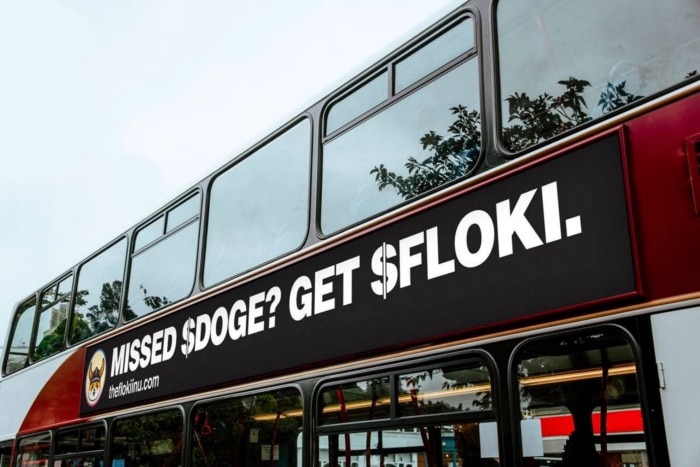London transport hit by ‘aggressive’ marketing ‘assault’ from crypto meme coin Floki

A digital token named after Elon Musk’s new dog, Floki, has rolled out hundreds of adverts in the capital in what it’s called “a full-out assault of the London public transportation system,” raising questions as to who is responsible for high-risk investments being advertised so widely.
Floki Inu coin is one of many dog “meme” cryptocurrencies like Shiba Inu inspired by Tesla’s Elon Musk, who has repeatedly touted Dogecoins on social media, but this week sent Shiba Inu’s price plummeting when he tweeted that in fact he owns no coins.
In the past few weeks, a slew of physical adverts with the slogan ” Missed Doge? Get Floki” have popped up in tube stations, on trains and buses in the capital in a bid to get Londoners investing in the coin.
“To keep momentum moving, Floki Inu is assaulting the market with very targeted and aggressive marketing campaigns,” the coin’s promoters wrote on Medium last month.
“These advertising campaigns will run together and will be a full-out assault of the London public transportation system.”
Floki’s head of marketing, who went under the alias Sabre, told the FT that the broad advertising campaign aims to “legitimise” the coin and increase the “confidence of the average consumer” to buy it.
“You get a lot of scam artists in this game,” he told the FT.
In the same Medium post, Fluki said it had already contracted to spend almost $1.5m in marketing – which it funds by imposing a “marketing tax” of 4 per cent on its buyers.
According to the coin’s website, this is used “purely marketing purposes”, to fuel the “continued development of the Floki Inu ecosystem” and for “onboarding influencers”, paying for “strategic ads” and promoting events such as “sending Floki Inu tokens into space.”
Who is responsible for scrutiny?
Transport for London (TfL) will be keen to benefit from new advertising campaigns on its network as footfall increases, after suffering a record £100m plunge in advertising revenue across its network during Covid restrictions.
Chris Reader, head of commercial media at TfL, told City AM: “Since 2018, we have asked our advertising partners to refer all cryptocurrency advertising to us for review prior to it running on our estate.”
“When reviewing copy now from cryptocurrency brands who wish to advertise on our estate, we ensure that campaigns contain sufficient information to comply with both our policy and the ASA ruling.”
Meanwhile, FCA chair Charles Randall last month called for the City watchdog to be given more powers to regulate adverts that are related to cryptocurrencies, to clamp down on fraudulent claims and warn people of the risks associated with such high-risk investments.
He also urged people not to take cryptocurrency advice from ads on social media by influencers, warning at the time: “Social media influencers are routinely paid by scammers to help them pump and dump new tokens on the back of pure speculation. Some influencers promote coins that turn out simply not to exist at all.”
And last week, the watchdog published research that showed that 69 per cent of people who have invested in cryptocurrencies since the dawn of the pandemic erroneously believed that the product they invested in was regulated by the body.
The regulator’s research was prompted by the pandemic-fuelled surge of more than a million UK investors who increased their holdings or a bought a high-risk investment last year.
The UK’s Advertising Standards Authority (ASA) has pledged a crackdown on misleading marketing for crypto advertisements that doesn’t highlight the risks of investing, classing them as a “red alert” priority.
Since the ASA launched an ad alert system to pick up on false adverts last year, the watchdog said that 95 per cent of the alerts it has received have been related to bitcoin scams.
The ASA has been asked for comment.
TfL has received three emergency funding packages from central government since March 2020. Three weeks ago, the beleaguered network asked the Treasury for half a billion worth of support for the rest of the financial year and for a further £1.2bn next year to “ensure London’s recovery” from the pandemic.